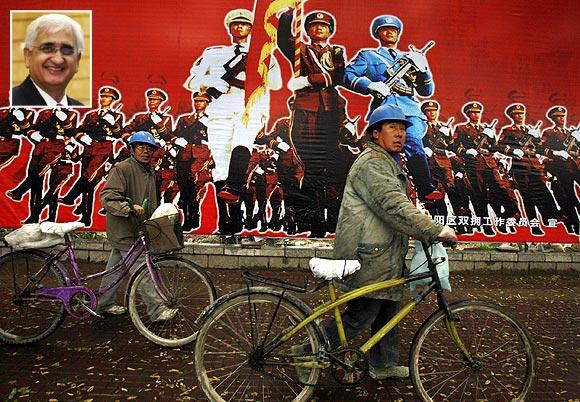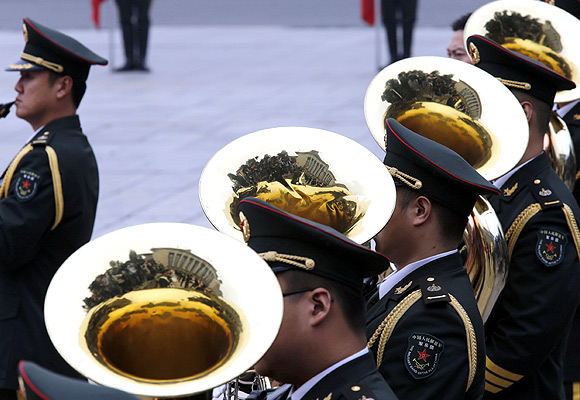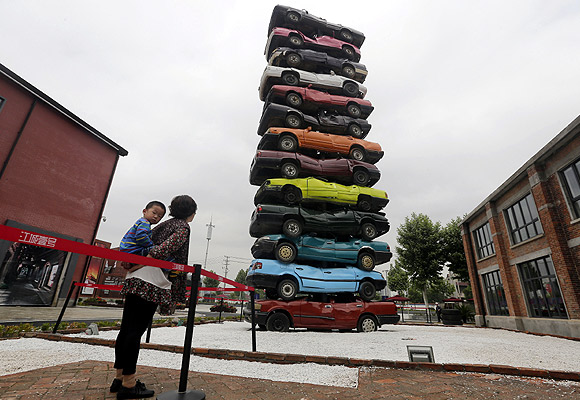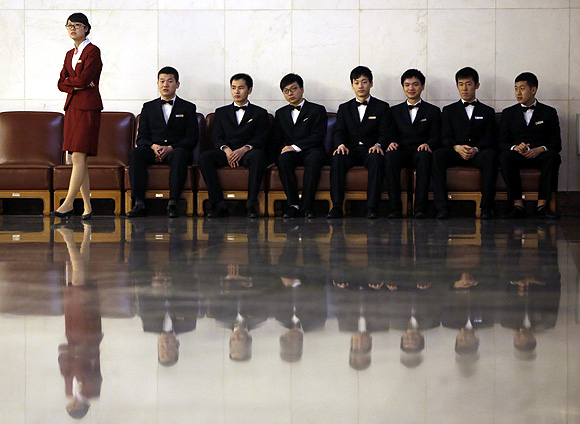
Before embarking on a two-day visit to China on May 9, External Affairs Minister Salman Khurshid interacted with members of the Chinese media and fielded questions about the recent stand-off in Ladakh and trade ties with the Communist nation
Salman Khurshid: Good morning. This is a good opportunity to talk to all of you together. I do not know if you and your newspapers and channels use the same high pitch that we have in our media. But it is a challenging thing and interesting part of modern times -- both in conventional media as well as the social media -- that we now have to encounter in a growing way.
Chinese media: Mr Minister, what do you expect of your forthcoming visit to China and what would be the impact for the development of relations between our two countries during your visit and also the visit by the Chinese premier?
Salman Khurshid: Two things. One is that it is part of the business of handling foreign relations with friendly countries, with our neighbourhood, and this very special relationship that we have with China. That is part of my job. Therefore, I am just doing my job.
Having said that, there are special features. This is my first visit as an external affairs minister to China. We have been hoping to do this visit for some time but there were very important changes, historic changes, on the Chinese side with the new leadership taking over from the old leadership that had over the last decade developed a very sound and a very good relationship with our leadership.
And we were given the message both by the outgoing leadership of China as well as new leadership at various levels and in the meetings that took place at multilateral summits that it is the intention of the new leadership of China to not only continue with this excellent relationship but also look at the possibility of enhancing it and helping it grow.
That is a very welcome signal that we receive with not only a great satisfaction but we reciprocate it with the same depth and the same commitment with which it has been made.
Having said that, words are not enough in any relationship. You need to work to fulfil the words that are said at important meetings and that is the job that we have to do at different levels, at the level of the foreign minister, at the level of the foreign secretary, at the level of other officials of the foreign ministries and also people-to-people, plus at different departments, different levels. To lay that out in a sense for how we proceed and how we improve and how we further develop our relationship.
To take stock of that I think the new foreign minister, and it so happens that there are new foreign ministers on both sides, had to come together and work out a plan, work out a scheme, work out priorities, look at and take stock and see there is something that needs to be given a push, need to see whether there is something that needs to be reviewed, re-examined, some things on which we need further consultations. So, this is one major part of my visit.
The other one of course will be for both sides to work out the steps that need to be taken for the Chinese premier's visit here which is only ten days after I visit China. Of course, the background work has already been done. But it is good to take a look at it, refresh our memory, and look at what any further work needs to be done, prioritise and examine the content that will finally be placed before the leaders during the delegation-level meetings in Delhi and their own private meetings.
So, preparation for the writing of a new chapter by our respective leaders, writing of a new chapter in the relationship which is both valuable, important, not just to the two of us but also to Asia and to the world, so, really to check out the work that needs to be done for the beginning of the new chapter in our relationship.
Click on NEXT for more...

Chinese media: Mr Khurshid, my question is also related to your upcoming visit to China. What is your main concern and expectation from the Indian side for your visit?
Salman Khurshid: My priority is how to develop a very good working relationship with the foreign minister.
In international relations, in foreign policy, a great deal has to do with historical circumstances, a great deal has to do with the sense and perception of people. Governments follow their people. A great deal has to do with the vision of the leadership of governments. They have a vision and they translate that to their people and to their counterparts in other countries. A great deal has to do with personal equations, personal chemistry. You can fulfill and achieve a great deal if you get along well as individuals, as people, as persons.
I think that it is also very important for foreign ministers to develop a personal chemistry and relationship which can help you overcome many challenges that arise in the normal course of doing business with neighbouring countries or with countries across the globe. And it would be my effort -- it is a short time, two days is a very short time to build up a relationship but sometimes it can happen very quickly, sometimes you have to work very hard on it. I am hoping.
I am hoping that we will strike the right chord in our meeting. I think the historical circumstances are favourable, and we have a huge, huge obligation on us in respect to the expectations of our people and of our leadership. And I will try to see that we can strike a chord and be good friends so that we will find it easy to transmit and translate the vision of our leaders towards a more meaningful and valuable relationship between India and China.
Click on NEXT for more...

Chinese media: As the foreign minister, what is your plan?
Salman Khurhsid: There are some objective things and there are some subjective things. Objective things are we need to work together -- and both of us know that, we need to work together -- on addressing the trade deficit, not because we are being more concerned about ourselves or being selfish. But to be sustainable, a trade relationship has to be a balanced one. If there is an insurmountable difficulty of being able to address in the short run the issue of trade, of balancing trade, then you can set it off against investment. So, it is possible that you have investment flows from one country to the country that has trade surplus so that an overall economic balance between the two countries is established. This is what we are working together to do between India and China, looking at how we can balance our trade but also that in the short run to offset an imbalance of trade through investment.
But investment standalone itself is important because in today's world there are two important ways how you get people to come together, not just governments but people to come together. One is by having cultural exchanges -- in culture I include sort of education and soft culture like tourism and so on -- and the other one is by investment.
If you have a Chinese company investing in India, producing in India, and have a huge number of Indians working for the Chinese company, that is a stronger bond than you can provide by opening an embassy because you are dealing with people's immediate aspirations which is a job, food, employment security and learning to work together, what they call work culture.
I think that it is our aspiration that there should be some really conspicuous big Chinese investment projects in our country, as indeed we are encouraging our companies to go to China. Some of our business organisations have established offices for outreach in China. A lot of our businessmen are now exploring opportunities in China. There are joint projects and collaborations that are taking place in areas such as steel. But we must always keep in mind that we are both partners and competitors.
There will be market places where goods from both countries will be on the shelves and we will have to compete. Maybe you would get an upper hand in certain goods and we will get an upper hand in certain goods. In certain cases, you will just have to have a greater choice to give choice on a menu which gives both the Chinese product and the Indian product. In some cases we will have to collaborate. But these are things that the market will partly decide and partly because we both believe in planning in our economy, at least to some extent. To some extent our planners will decide which means how do you incentivise, how do you decentivise, how do you regulate, how do you control.
But at the same time, the same selection process will continue in the market place as well where you have some strengths and we have some strengths. But, as our prime minister has said, the world is a large enough place to allow India and China both to work and to live in very comfortably, sometimes holding hands, sometimes walking together, sometimes racing each other, sometimes as competitors and sometimes as collaborators and partners.
So, these are very important dimensions and features of our relationship and each dimension and each aspect has to be worked upon, either encouraged or actually physically and intellectually worked upon to ensure that we get the best for our people.
Click on NEXT for more...

Chinese media: Your Excellency, as the minister of external affairs, what is your understanding about China's importance within India's foreign policy in the background of the global scenario?
Salman Khurshid: China's place in the world, both historic as well as in terms of an economic power, is well known. At the same time, China has arrived late in certain places. In the World Trade Organisation for instance, China has just arrived in the WTO. Therefore, you have to make your mark in the WTO.
Now you have many complementarities with us as far as WTO is concerned and we vigorously supported your presence in the WTO. Russia again is new to the WTO and the Russian industry will be in a sense adjusting and accommodating to the WTO. But both Russia and China still have to pick up domain knowledge of the WTO and begin to contribute more substantially and more effectively to the WTO.
But we are working, China and Russia, we are working in BRICS together. And I think that in a sense is an ideal situation for us to harmonise and to converge on positions that we take multilaterally or positions that we take on important issues such as restructuring and reform of the international financial architecture, also of the United Nations etc.
I do not think that we can say that immediately, instantly we have to agree on everything. It is a process of dialogue by which we learn from each other's experiences and factor in each other's aspirations. So, this is for us very important and, therefore, you can see that while we want friendships across the globe and China has friends across the globe, and not all of our very fast friends are your fast friends, and not all of your very fast friends are our fast friends. But there are many friends we have in common.
We cannot be absolutely completely alike because our circumstances are different, our aspirations are different, our historical experiences are different. But the effort has to be while working together bilaterally or in organisations like BRICS or for instance working in the United Nations, the effort has to be if we can bring our positions and align our positions to make them much closer and effective.
I hope that what I am saying about China, I hope you will hear from the Chinese leadership about India as well because we are proud to be able to say that we have made remarkable strides as far as economic growth and development are concerned.
Of course in many ways China is far ahead of us because despite having a strong socialist system, China went into the economic reform at least a decade before us. We came a decade later. And China is on a faster track of reform than we are. Our reform requires consensus building all the time.
In China, you are led from the front, you are led from the top and you are able to show the advantage of reform very quickly to the people, so get an endorsement from the people for reform. Because our reform goes slow, it takes much longer to show the advantage to the people. Therefore, to get the endorsement also takes time. So, it is a kind of a chicken and egg story.
But we hope that the importance that we think China has in the scheme of things as we plan our view of the world, I hope is also if not entirely substantially also felt by the Chinese leadership about India. And as I said, our historic experiences could be different, and therefore, we may have to put in more effort to align our future aspirations.
If your past is different, your future to be aligned requires greater effort. If your past is similar, then your future is easier to align. But this is something that both sides know and we have worked towards this and periodically we will go fast, periodically we will slow down depending on circumstances that prevail in the world.
But I think the direction is very clear. India and China collaborating to give substance to people's belief that the 21st century is the Asian century, is an imperative. India and China have to collaborate for the Asian century.
Click on NEXT for more...

Chinese media: What would be your view towards the China-India relationship under the new circumstances?
Salman Khurshid: I am very optimistic. I have very positive aspirations. I think it is a very great opportunity. I think the first signals that have come from the new Chinese leadership are extremely welcome, positive, and will be reciprocated in full substance from us. We are looking forward to a meaningful decade of working with the new leadership.
Chinese media: Mr minister, I have another question. In China we have a saying that bad things can turn into good things. The recent incident in Ladakh, both countries handled it very well and peacefully resolved the dispute. Can I say that this means that the Sino-Indian relation is getting more matured and at the same time can this way of handling set a precedent, an example for the future similar incidents?
Salman Khurshid: To be honest with you, I personally think we have shown tremendous maturity but also more than maturity we have shown tremendous understanding of each other. In these matters if you do not have fundamental understanding of each other, you can misunderstand such gestures. But to keep them at a proportionate level and contain them as limited or localised and not necessarily part of a larger scheme things, it is important to have a fundamental understanding of each other.
I think we have developed that over the years and that is a wonderful thing. But what we have as governments, I think a lot of people who pass off as scholars of India-China relations have also to develop that understanding. There is an impatience in them. You cannot dictate timelines on everything that happens between friends. Timelines and pushing people and making people take hasty decisions can cause them to make mistakes.
Both India and China are ancient civilisations and I do not think that we can work towards instant solutions. We have to savour even the process of resolving anything that might appear to be a disagreement. We have to savour the moment and to show patience and understanding. I feel a sense of comfort that in our dealings with China in the recent weeks I found that that was exhibited by both sides in a very great measure, and that I find an extremely, extremely comforting and satisfying feeling.
Click on NEXT for more...
...